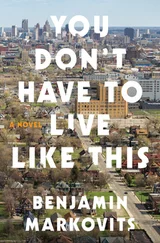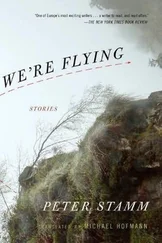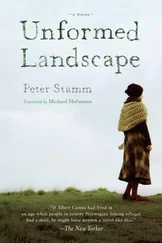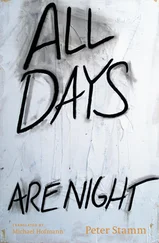“What does your girlfriend say about you going to meet me all the time?”
“That’s over. She went back to France. It wasn’t anything serious.”
“Tell me about her.”
Andreas said he didn’t know what to say about Delphine. He didn’t want to think about her or talk about her, least of all with Fabienne.
“What does she look like?”
“Short brown hair, quite a pretty face. About as tall as you, but not such a beautiful figure.”
“How old is she?”
“Twenty-four.”
“Do you love her?”
“I don’t think so. Certainly not as much as I loved you.”
As I love you, he thought, but didn’t say it. He said there had been a time that he could imagine starting a family, having children, settling down somewhere. But that time had passed. He couldn’t even claim to regret it. He wasn’t sure he still wanted to love someone as passionately as when he was twenty.
“What about her? Does she love you?”
“I don’t know. I think she might.”
“And isn’t that enough for you?”
She asked what had made Delphine go back. Andreas wanted to tell her that he wasn’t going back to Paris, that he would stay in the village, but suddenly his plan struck him as absurd. He had come here on her account. If the story with her was over, there was no sense in staying here. He said he had quarreled with Delphine. Something trivial.
“That’s none of my business,” said Fabienne.
They were back at the hut. Fabienne said she was expected at home, her menfolk would be back soon.
“And you’re making lunch for them.”
“Yes,” said Fabienne. “I’m making lunch for them.”
“Will you tell Manuel? About what happened?”
Fabienne shook her head. What for? She gave Andreas her hand and said good-bye. He shook hands, and kissed her on the cheeks. She got on her bike. She had ridden a few yards when she stopped.
“I almost forgot something,” she said. She got down, and pulled the little book Andreas had given her out of her jacket pocket. He came a little nearer, but he didn’t take the book.
“Did you read it?”
“Yes.”
“And?”
“There must be hundreds of stories like ours.”
“But all the details. The fact that I called you Butterfly …”
“That wasn’t you. That was Manuel’s name for me.”
“And the cat she buys herself when she returns to Paris?”
“I never had a cat.”
Andreas asked if she was sure. Fabienne laughed at him.
“That must have been a different girl.”
“I suppose it’s the story of you and Manuel, then,” said Andreas.
“No,” said Fabienne, “it is our story. What I have with Manuel isn’t a story. It’s reality.”
They stood and faced each other. Then Fabienne put her arms around Andreas and kissed him on the mouth. It was their first kiss. Her lips were dry and a little rough, it was the kiss of a young girl. They kissed for a long time until they were both out of breath.
“Keep the book,” said Andreas as they finally broke.
Fabienne smiled. Without another word, she got on her bike and rode off. Andreas watched her go. She stood on the pedals, the bicycle swayed from side to side. The road led along the edge of the forest, past a meadow full of old fruit trees and a farmhouse. By the time Fabienne reached the first houses in the village, she was just a yellow dot.
Andreas went back to the hut, and sat down on the wooden bench that ran along the front of it. He felt weak, but his head was clearer than it had been for months. He felt nothing but a kind of jaunty indifference. It was as though he had got rid of a weight, something that had been oppressing him for eighteen years. Presumably his life would have been different if he had mailed the letter then. There was even something mildly consoling about that. If Fabienne had turned him down then, his long wait would have seemed even more pointless.
He tried to remember time spent with her, but he kept coming back to the same scenes. The forest, the lake, the cinema in Paris. He remembered every particular, saw Manuel, Beatrice, the other young men and women they hung around with that summer, he even saw himself. Only Fabienne looked oddly out of focus in those scenes. But with that last kiss — their first kiss — Fabienne had finally come to life. It was only the kiss that counted.
Andreas thought about his childhood, his growing up, the time when happiness or misery, love or panic had been able to fill him completely. When time itself seemed to stand still, and there was no way out. He no longer wanted to love the way he had at twenty, but sometimes he missed the intensity of feeling he had had at that age. And those moments, in which everything suddenly was over, that feeling of total insignificance, and at the same time of complete freedom. A pure perspective on the world that almost took his breath away with its beauty, the patterning on a piece of wood, some peeling paint, a little shred of paper left under a thumbtack, the rust stain on the head of a nail. He ran his hand over the bench he was sitting on, over the wall of blackened, weathered boards he was leaning against. He inhaled deeply, and smelled the damp and moldy smell of the forest, and the sweet accent of some late-flowering bush. He could remember how he had felt, but he couldn’t feel like that anymore.
He probably wouldn’t see Fabienne again. Anyway, it didn’t matter if he did or not. Their story was at an end. One story among a very great many that began and ended at each moment.
Andreas walked along the road toward the village. He passed the little general store where he had sometimes bought candy when he was a boy. He came by here on his way to school, and when he had money he would go in and buy chocolate or biscuits. Back then, he had always been hungry, and had always eaten a lot of sweets between meals. Over the years, his appetite had decreased. Some days, he didn’t eat much more than a sandwich at lunch, and another one at night.
He walked into the store, and went up and down the aisles. He bought a bottle of wine, and a couple of bars of chocolate. There was a young woman sitting at the cash register. To go by her accent, she wasn’t from around here. She made some comment about the weather. It had been a bad summer, she said, and Andreas nodded and said one could only hope that the fall would be nicer.
“Maybe it’ll warm up again.”
The checkout girl said she doubted it.
Andreas walked down the street where he had grown up. It was midday, and there was no one out in any of the gardens. One house had got a new coat of paint, another had had a garage built on to it. Apart from that, nothing seemed to have changed. The enormous pine opposite Andreas’s parents’ house had been cut down. Where it had once stood, there was now only a stump, and, beside it, a newly planted sapling. It will take decades to grow as tall as the old tree, thought Andreas. It wouldn’t happen in his lifetime, or his brother’s or Bettina’s — maybe not even the children would get to see that happen.
As Andreas stepped through the squeaky gate, Walter appeared at the open window. He looked at Andreas in bewilderment.
“What are you doing here?” he called out.
The next moment he came running down the garden path, then stopped. He seemed to hesitate. Andreas also hesitated, then he put his arms around his brother. Clumsily, Walter did likewise.
“Come in,” he said. “We were just about to have lunch.”
Andreas handed over the bottle.
“A Bordeaux,” said Walter, looking at the bottle appraisingly.
Andreas said he just wanted to look over the house and take a peek at the garden.
The flowerbeds were choked with a low growth of weeds, and the hazel bush on the west side had spread, and was now almost as high as the roof. Walter said the garden was his responsibility, but he didn’t have enough time. He was glad if he got around to mowing the grass every other week. Things grew pretty much as they pleased.
Читать дальше












